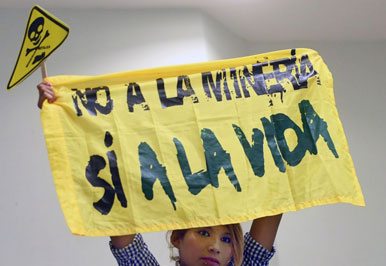
Wisdom, Robin Broad determined early in life, often emanates from ordinary people.
After
graduating from Williams College with degrees in economics and environmental
studies, Broad landed a fellowship that took her to the southern Philippines
for a year. There, she lived with a poor, indigenous family that had no running
water or electricity.
"I have never been more fulfilled in my life," she says. "That's when I learned you didn't have to use the words 'environment' or 'ecology' to be an environmentalist. People who live off natural resources, in my experience, tend to be very concerned about those natural resources."
Years later Broad recalled those lessons in El Salvador, where she researched and participated in a movement to ban gold mining, which many consider harmful to the environment. In April she became the first School of International Service faculty member to win the prestigious John Simon Guggenheim Memorial Foundation Fellowship. During her sabbatical, she will work on a book "debunking the myth that people in poorer countries don't care about the environment—and that poorer governments can't care about the environment because they have to focus on economic growth."
Broad's involvement in El Salvador began in 2009, when former AU chaplain Joe Eldridge introduced her to five people from the northern part of the country who were leading a fight to keep mining out of their communities.
"When they first heard that mining companies wanted to come in, their initial reaction was, great, we need jobs," she says. "But they somehow had the wherewithal to say, let's find out about mining. They crossed the river and looked at the reality of mining in Honduras and saw what an environmental disaster it was."
In order to separate gold from the rock, mining companies use cyanide, Broad says. In El Salvador, as in many parts of the world, arsenic is released along with the gold. In addition, exposed sulfides turn into sulfuric acid, which can contaminate soil and water.
"There's one area I've been to in El Salvador where the river is Kool-Aid red," she says. "It's absolutely not potable or usable in any way."
The daughter of a metallurgical engineer, Broad is clear in her belief that mining should not be banned everywhere. But she also feels there are many places, like northern El Salvador—which is part of the country's key watershed—where the environmental costs are too great to allow it.
Apparently, the government of El Salvador agrees. In March the country became the first in the world to pass a law banning metals mining. Broad was there for the unanimous vote. Because of her involvement in both the scientific and political parts of the process, she is uniquely positioned to chronicle the story.
"If it's possible for the government of a very poor, small country like El Salvador that desperately needs foreign exchange, and for poorer people who desperately need jobs, to say we understand that we can't just look at short-term profits—we are going to take into account the environmental realities of a situation—then it means it should be possible for the whole world to do it," she says.
Wise words,
from an extraordinary scholar.